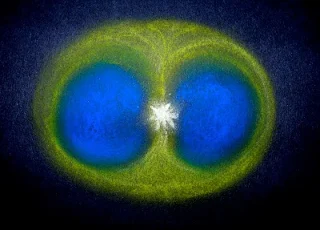We are often advised to "stay centered" in order to better deal with life's challenges. This is timeless advice. Most ancient philosophies, in the West and the East, incorporate some version of "staying centered."
Both the Bible and the Tao Te Ching promote the memes "stay centered," and "walk the straight and narrow path." For example, during the Sermon on the Mount, Jesus said,
Enter by the narrow gate; for the gate is wide and the way is broad that leads to destruction, and there are many who go in by it. Because narrow is the gate and difficult is the way which leads to life, and there are few who find it. (Matthew 7:13)
And Lao Tzu similarly recommended,
The great Way is easy, yet people prefer the side paths. Be aware when things are out of balance. Stay centered within the Tao. (from verse 53, Tao Te Ching, Stephen Mitchell translation)
In the examples above, "staying centered" refers to keeping to a narrow field of possible action, as opposed to broader or more diverse paths.
Another way to "stay centered" is expressed by the Golden Mean, which Aristotle described as keeping to the beneficial middle and avoiding extremes. In Chinese philosophy this is called the Doctrine of the Mean. In Buddhism the same meme is called The Middle Way. Each tradition uses slightly different words and metaphors, but they all articulate the same meme.
Staying centered means keeping your conscious focus on the here and now, remaining poised in the present between past and future. Staying centered means allowing your Unit of Consciousness to align with the Universal UC, rather than with your ego. Staying centered acknowledges that the answers lie in the immediate present, not out there in some other place or time.
According to the Simple Explanation, information from the metaverse flows into our universe through the dynamic patterns of the Universal UC. In our model, the patterns of our space-time continuum emerge fractally from the zero-point field at the center of the Universal UC. These patterns are both ideal and material. Idealistic patterns include, for example, the laws of physics, mathematics, and karma. Material patterns are expressed in the 3-D universe with which we are all familiar.
When I image nestling backward into the Universal UC, I imagine falling smaller toward the ananda/joy direction, while still feeling the outer skin of the Universal UC holding from the outside and flowing through the middle. Perfection and possibility emerge from the middle as the universe instantiates around me. This would be the truest expression of the meme "stay centered".
Both the Bible and the Tao Te Ching promote the memes "stay centered," and "walk the straight and narrow path." For example, during the Sermon on the Mount, Jesus said,
Enter by the narrow gate; for the gate is wide and the way is broad that leads to destruction, and there are many who go in by it. Because narrow is the gate and difficult is the way which leads to life, and there are few who find it. (Matthew 7:13)
And Lao Tzu similarly recommended,
The great Way is easy, yet people prefer the side paths. Be aware when things are out of balance. Stay centered within the Tao. (from verse 53, Tao Te Ching, Stephen Mitchell translation)
In the examples above, "staying centered" refers to keeping to a narrow field of possible action, as opposed to broader or more diverse paths.
Another way to "stay centered" is expressed by the Golden Mean, which Aristotle described as keeping to the beneficial middle and avoiding extremes. In Chinese philosophy this is called the Doctrine of the Mean. In Buddhism the same meme is called The Middle Way. Each tradition uses slightly different words and metaphors, but they all articulate the same meme.
Here is the Simple Explanation of "Stay Centered":
 |
| Staying Centered Near the Vortex Maintains Alignment with the Metaverse |
According to the Simple Explanation, information from the metaverse flows into our universe through the dynamic patterns of the Universal UC. In our model, the patterns of our space-time continuum emerge fractally from the zero-point field at the center of the Universal UC. These patterns are both ideal and material. Idealistic patterns include, for example, the laws of physics, mathematics, and karma. Material patterns are expressed in the 3-D universe with which we are all familiar.
Spiritually, the best solutions arise from God, also known as the Universal UC, or the metaversal fractal. Answers to problems are not found in the broad pathways of the world; attempting to find answers "out there" will not align you with the metaversal plan. Keeping to the center aligns one with God's will.
When I image nestling backward into the Universal UC, I imagine falling smaller toward the ananda/joy direction, while still feeling the outer skin of the Universal UC holding from the outside and flowing through the middle. Perfection and possibility emerge from the middle as the universe instantiates around me. This would be the truest expression of the meme "stay centered".


